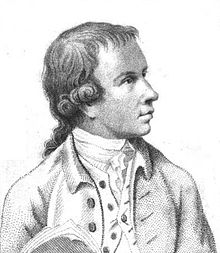Loading AI tools
Scottish poet (1734–1788) From Wikipedia, the free encyclopedia
William Julius Mickle (29 September 1734 – 28 October 1788)[1] was a Scottish poet.
This article needs additional citations for verification. (March 2024) |
William Julius Mickle | |
|---|---|
 | |
| Born | 29 September 1734 |
| Died | 28 October 1788 (aged 54) |
| Occupation | Poet |
| Family | William Julius Mickle (great-grandson) |

Born in Langholm on 29 September 1738 to a minister, he was for some time a brewer in Edinburgh, but failed. He moved to England where he worked as a corrector for the Clarendon Press at Oxford. In 1771–75 Mickle lodged at the manor house in Forest Hill, Oxfordshire. Mickle had various literary failures and minor successes until, while at Forest Hill, he produced his translation of the Lusiad, from the Portuguese of Luís de Camões. This was a success that brought him both fame and money.
In 1777, he went to Portugal, where he was received with distinction. In 1784, he published the ballad of Cumnor Hall, which suggested to Walter Scott the writing of Kenilworth. He is perhaps best remembered, however, by the beautiful lyric, "There's nae luck aboot the Hoose", which, although claimed by others, is almost certainly his.
In 1781 Mickle married Mary Tomkins, the daughter of his former landlord in Forest Hill, and settled in Wheatley.[2] He died in 1788 while on a visit to his in-laws in Forest Hill, London, and is buried in Forest Hill churchyard.[3]
His namesake and great-grandson, William Julius Mickle, became a distinguished medical doctor.
Seamless Wikipedia browsing. On steroids.
Every time you click a link to Wikipedia, Wiktionary or Wikiquote in your browser's search results, it will show the modern Wikiwand interface.
Wikiwand extension is a five stars, simple, with minimum permission required to keep your browsing private, safe and transparent.